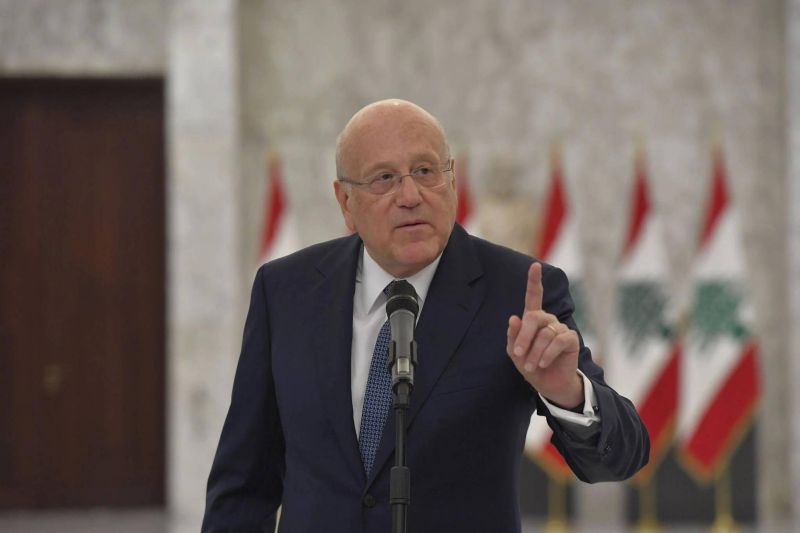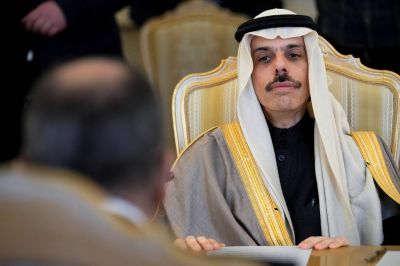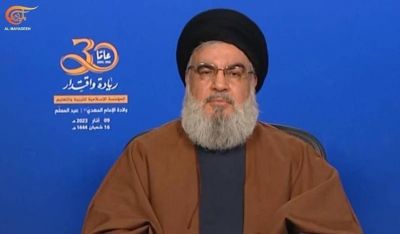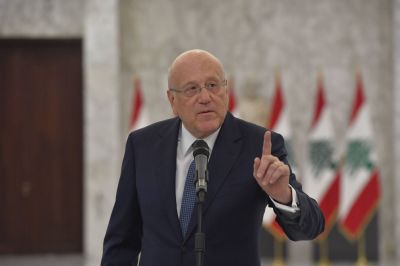
Lebanese Prime Minister-designate Najib Mikati in Baabda on Aug. 5, 2021. (Credit: Nabil Ismail/File photo)
BEIRUT — "I have already warned that the crisis in Lebanon can explode at any time," caretaker Prime Minister Najib Mikati warned in an interview published on Sunday, in which he pleaded for the "rapid election" of a president of the republic, while saying he is "very satisfied" with the restoration of diplomatic relations between Iran and Saudi Arabia and believes that this could have positive repercussions in Lebanon.
The head of the Maronite Church, Bechara al-Rai, welcomed, for his part, the beginning of a "political reconciliation" between Riyadh and Tehran, drawing a parallel with the Lebanese crisis and calling for reconciliation between the various political groups.
Lebanon has been without a head of state since the end of President Michel Aoun's mandate in October, and the country's deep economic crisis has been coupled with a political crisis, with a power vacuum at presidential level and at the level of the government, which has been serving in a caretaker capacity since May last year.
Reform 'before the crisis gets out of hand'
In an interview with the daily Al-Sharq Al-Awsat, Mikati underlined that he has always said, even before assuming the role of prime minister, that the Lebanese crisis "remains in a bottleneck and can explode at any moment."
"It is necessary to quickly carry out the required structural reforms before the crisis degenerates and reaches the point of no return," he continued. "It is therefore necessary to quickly elect a new president, which will allow Lebanon to enter a phase of respite with the formation of a new government and the start of a reform process," he added.
Mikati's cabinet, in its caretaker capacity, is limited by its remit to running day-to-day affairs.
Mikati also said he was "very pleased with the latest developments between Saudi Arabia and Iran," assuring that "Lebanon spontaneously supports any consensus process in the region, especially since Saudi Arabia is a significant player, Arab and Islamic, and has a vast regional influence."
He added that this development "must be reflected throughout the region, including in Lebanon" and is "an opportunity for a new breath in the region, to move forward."
Mikati also welcomed the words of Faysal Ben Farhan, Saudi foreign minister, who said that Lebanon needs a Lebanese rapprochement and not an Iranian-Saudi one. "As Lebanese, we should not wait for the foreigner, we must fulfill our duty to elect a president and rebuild the institutions," Mikati said.
Saudi's foreign minister regularly calls for the speedy election of a Lebanese president and recently stressed the need for "security and stability" in Lebanon with his French counterpart, Catherine Colonna.
Rai castigates 'crime of the MPs'
For his part, Maronite Patriarch Bechara al-Rai also welcomed Sunday the restoration of diplomatic relations between Iran and Saudi Arabia, hailing a "political reconciliation" and advocating in this context for reconciliation between the various Lebanese parties.
"We bless this step which is part of a framework of political reconciliation," the head of the Maronite Church said during his Sunday homily in Bkirki.
In words, reported by the state-run National News Agency, he added: "We hope that this reconciliation will take place in Lebanon in order to regain our natural identity, that of neutrality in relation to conflicts and foreign wars." The patriarch also reportedly recalled that the country is "the place of meeting and dialogue of religions and civilizations."
Speaking about the presidential election, Rai said that "the crime committed by the nation's MPs is the non-election of a president because of divisions."
The country has been without a president since Oct. 31, when Aoun's six-year term in office came to an end. Some 11 electoral sessions have been convened in Parliament, but Lebanon's MPs have not succeeded in electing a successor.
"Who has the right of veto? What right do we have to impose someone? If you want dialogue, come and just deal with the needs of the country," the prelate said.
In recent days, Hezbollah leader Hassan Nasrallah has called for a dialogue around the presidential election, after announcing his party's official support for the candidacy of Marada Movement leader Sleiman Frangieh.
Geagea open to other candidates
According to some observers, the rapprochement between Iran and Saudi Arabia could significantly influence the outcome of the presidential election in Lebanon, one way or the other, while Hezbollah, an ally of Iran, officially supports the candidacy of Frangieh, known for his closeness to the Syrian regime. On the other hand, the opposition parties, some of which are close to Saudi Arabia, are hostile to Frangieh's candidacy. Some of them, like the Lebanese Forces (LF), support the candidacy of the Zgharta MP Michel Moawad.
"We continue to support the candidacy of Michel Moawad, for the time being, but we are open to dialogue with the opposition forces around any alternative candidate who would have the required criteria and who could unify the ranks of the opposition …," Samir Geagea, leader of the LF, said at a partisan event on Sunday, according to remarks reported by the NNA.


